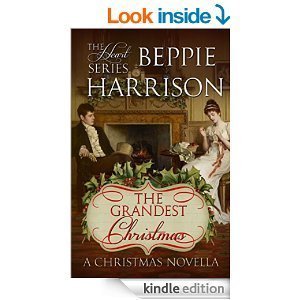Beppie Harrison and Ireland
Hi, everyone! I’m thrilled and honored to have historical fictional author Beppie Harrison talking about her muse, Ireland. Oh, how I’ve always wanted to go there myself. One of these days. But in the meantime I get to read Beppie’s post about why she picked Ireland and why she’s continued to write about it. Yay! Oh, by the way, I won’t be posting next week, so I’d like to wish everyone a little early a happy Thanksgiving!!! I feel so very blessed to have so many authors sharing with me. Thank you, everyone! So without further ado, here is Beppie and some music to enjoy while you read!
I fell in love at once with Ireland, at the same time ancient beyond human memory and bustling in the 21st century with two nations bumping shoulders on the same small island. When I was at university I was intrigued with the place, but ten years in London during The Troubles put me off entirely, and it wasn’t until we came to the States that the attraction in my blood bubbled up again.
So why has that been the place where I’ve launched my fictional universe? 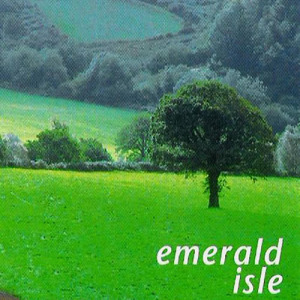
Well, it’s green. A deep soul-satisfying green. Unfortunately, green is also what you get when it rains a whole lot, and Ireland, on the western edge of the European landmass certainly picks up its share of moisture sweeping eastward across the Atlantic. As a visitor, I have to be honest and admit that Ireland is much more lovable in the sunshine, but when you live there and a mac (raincoat) and umbrella are part of your basic equipment life goes on swirling around you rain or no rain. But raining or not, you still get to appreciate the green!
Ireland is compact. Nowhere is that far from anywhere else—not at least when you have the North American sense of distance in your bones. Take this lovely picture here: 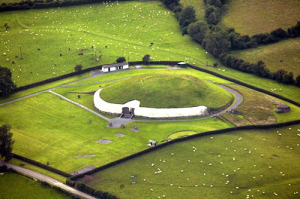
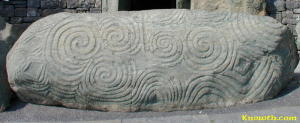 This is from outside the passage tomb at Knowth, near New Grange—the river valley that was the cradle of Irish civilization. This complex is dated from Neolithic times. But if you look at the view (very green, very Irish) you can see a hill that looks crowned with trees: that’s the Hill of Tara, the political and spiritual center of Celtic Ireland and the seat of the High Kings from the 11th century.
This is from outside the passage tomb at Knowth, near New Grange—the river valley that was the cradle of Irish civilization. This complex is dated from Neolithic times. But if you look at the view (very green, very Irish) you can see a hill that looks crowned with trees: that’s the Hill of Tara, the political and spiritual center of Celtic Ireland and the seat of the High Kings from the 11th century.
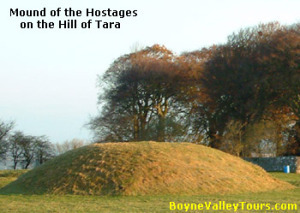 The views from there over the Boyne Valley, which stretches across the rich agricultural center of the country, are spectacular. Not far from either is Kells, an undistinguished town with a most distinguished history: it was here in 806 that the monks from Iona fled from the Vikings, and it might well have been here that the matchless Book of Kells, the most richly decorated of Ireland’s medieval illuminated manuscripts, was completed.
The views from there over the Boyne Valley, which stretches across the rich agricultural center of the country, are spectacular. Not far from either is Kells, an undistinguished town with a most distinguished history: it was here in 806 that the monks from Iona fled from the Vikings, and it might well have been here that the matchless Book of Kells, the most richly decorated of Ireland’s medieval illuminated manuscripts, was completed.
Ireland’s long history is an ordinary part of today’s Irishmen and women’s lives. In the market town of Trim—not far from the Hill of Tara or Dublin—you can walk home with your groceries past the Norman Trim Castle, built in the 12th century by Hugh de Lacy, a Norman knight. There’s a nice 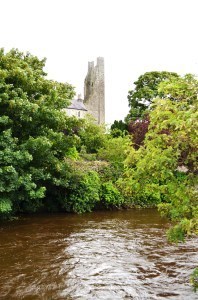 fragment of a medieval church rearing into the sky across the river.
fragment of a medieval church rearing into the sky across the river.
But I think what I like best are Irish people. They are matter-of-fact (and talkative!) now and so they seem to have always been. I ran across a wonderful little book called The Last of the Name, by Seárlas (the English called him Charles) MeGlinchey (the Blackstaff Press, Belfast, 1985), who lived his more than 90 years of life in Donegal, the narrow northwestern edge of the Republic of Ireland, pinned between the pounding Atlantic and the border of Northern Ireland. His story was written down almost 70 years ago by the village schoolteacher. Here’s what he has to say about the emigration to America, from the Irish side:
“It took the ship seven weeks and three days to cross over. The sailing vessels would have to take down sails is a storm got up, and they would often be blown back in one day what they went forward in three days. The vessel had provisions of some kind on board, but everyone took a supply of oaten bread as well with them. The whole townland would be baking and hardening oaten bread for whoever was going away. They were baking for a fortnight beforehand. The bread would be hardened two or three times till you could walk on it. All the bread was packed in a small barrel that the coopers made for the purpose, and everyone going to America had his barrel. They used to get a batáilte [armful] of straw at Derry quay and a bag of biscuits for a shilling. . . the straw was for sleeping on during the voyage.”
At least they were sent off with care and good wishes!
Please check out Beppie’s latest release The Grandest Christmas . . .
*The music is by Adrian von Zielgar who I’m fairly certain is my newest favorite composer. Isn’t her music wonderful?

